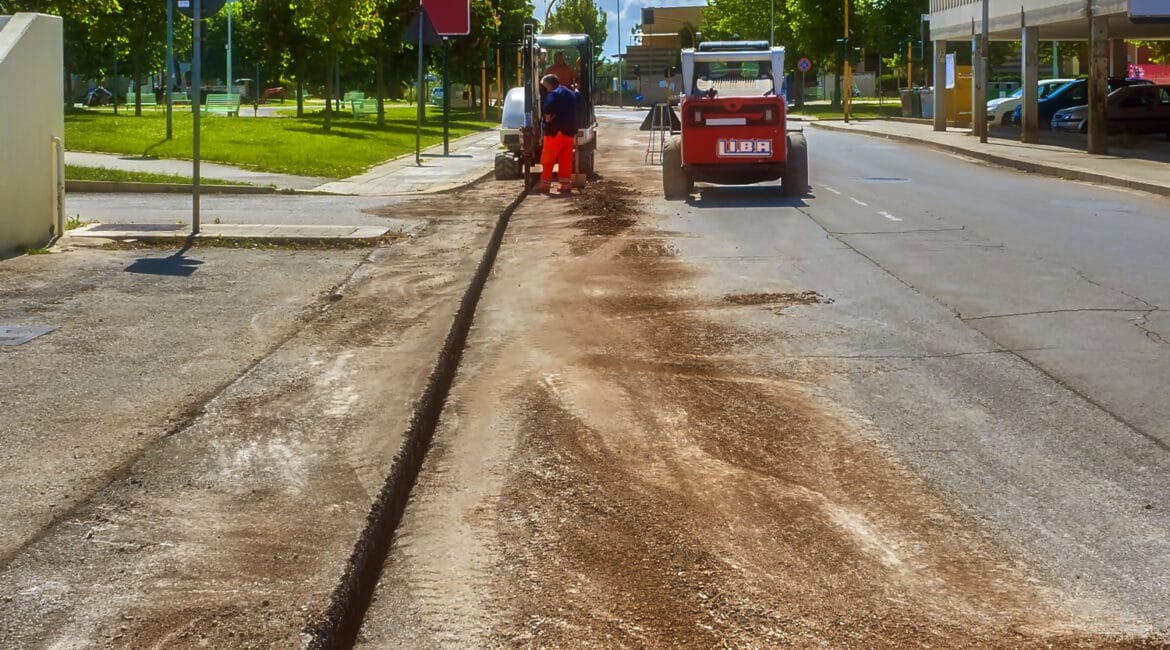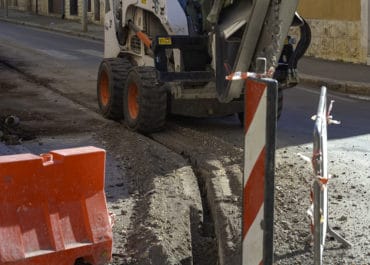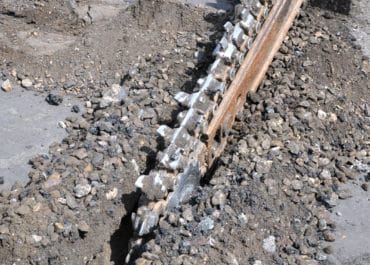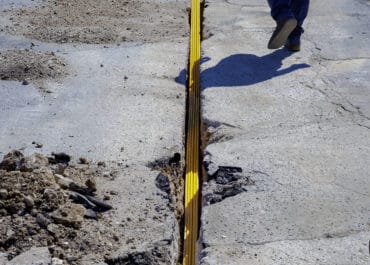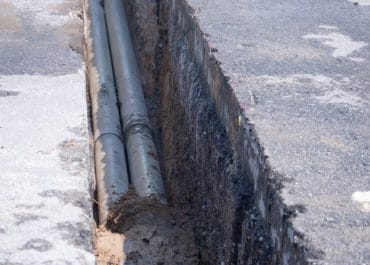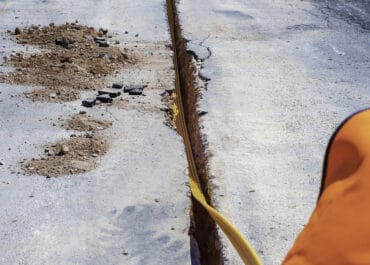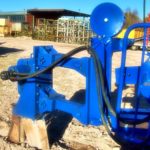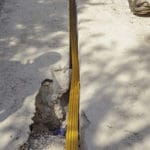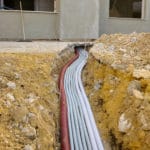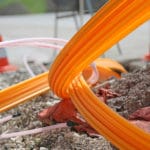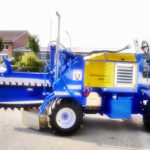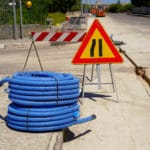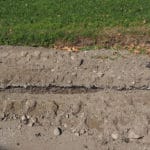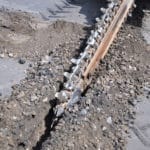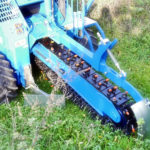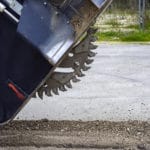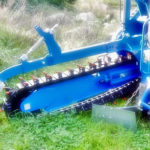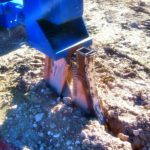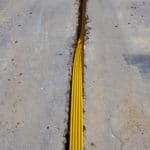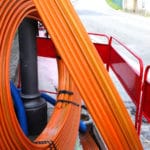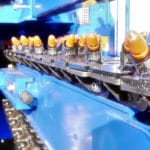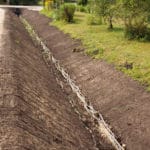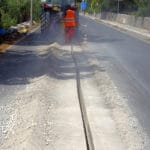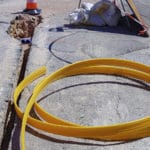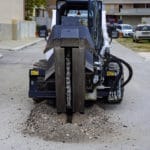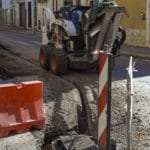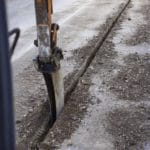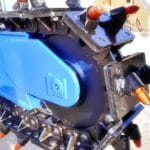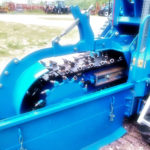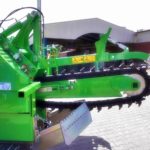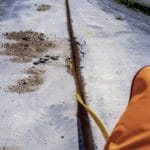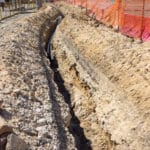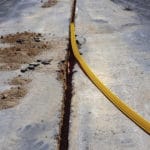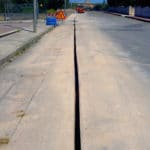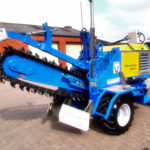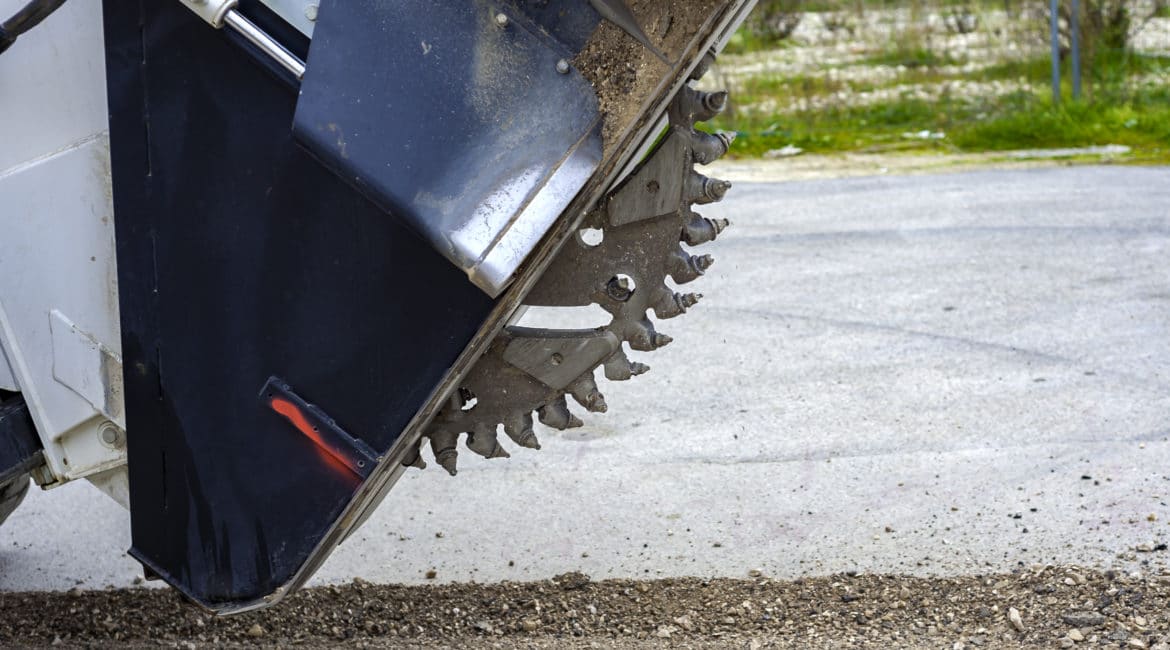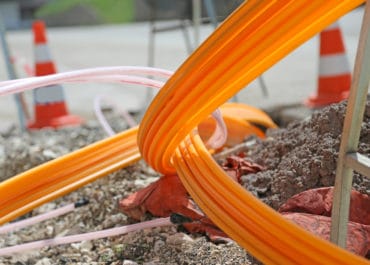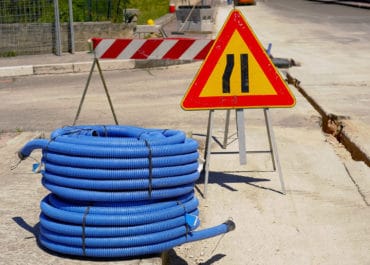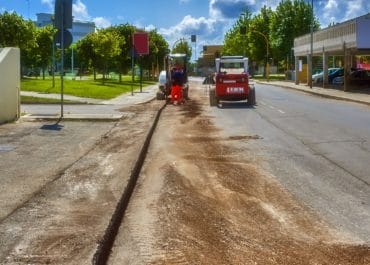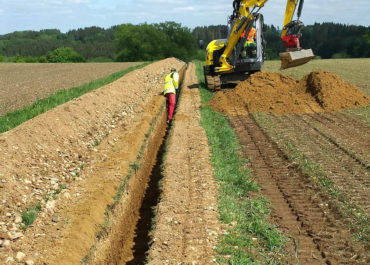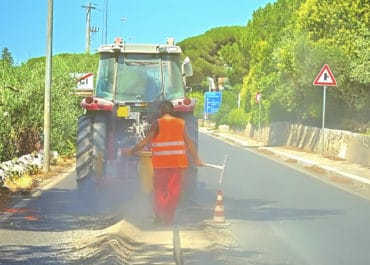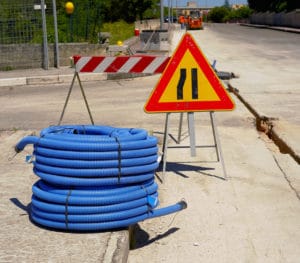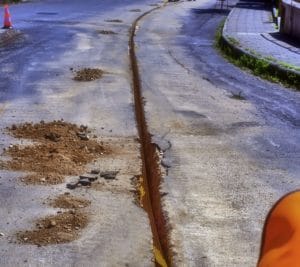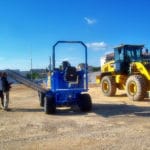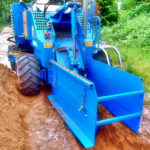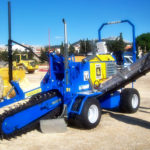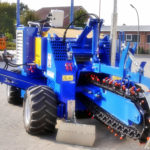Micro-Trenching mit den Grabenfräsen von LiBa
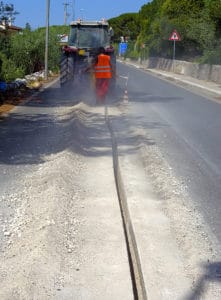 Die Glasfaser ist die Zukunft. Daten werden viel schneller übertragen als es mit Kupfer möglich ist. Nicht nur das Internet, sondern auch Radio, TV, Telefon und vieles mehr werden durch Glasfaser erheblich schneller. Dank modernster Technik und Verfahren ist es möglich, die Glasfaserkabel in kürzester Zeit unterirdisch zu verlegen. So kommt es beispielsweise, dass kleine ausgehobene Gräben von minimaler Breite an einem Tag ausgehoben und wieder verschlossen werden können.
Die Glasfaser ist die Zukunft. Daten werden viel schneller übertragen als es mit Kupfer möglich ist. Nicht nur das Internet, sondern auch Radio, TV, Telefon und vieles mehr werden durch Glasfaser erheblich schneller. Dank modernster Technik und Verfahren ist es möglich, die Glasfaserkabel in kürzester Zeit unterirdisch zu verlegen. So kommt es beispielsweise, dass kleine ausgehobene Gräben von minimaler Breite an einem Tag ausgehoben und wieder verschlossen werden können.
Micro Trenching – Noch effektiver Glasfaserkabel verlegen mit einer Grabenfräse!
Micro Trenching, oder auch Mini Trenching ist eine weit verbreitete Technik die es erlaubt z.B. günstig und schnell Glasfaserkabel zu verlegen. Die Vorteile: Micro-Trenching beschädigt wenig die Umwelt, da die Baustellen kleiner sind und dem entsprechend weniger Zeit in anspruch nehmen, somit gibt es weniger Verkehrsbehinderungen und weniger Luftverschmutzungen durch Abgase. Ebenfalls haben Projekte gezeigt, dass durch den Einsatz von Micro Trenching sowohl die Kosten, als auch die Arbeitszeit erheblich reduziert werden können.
Statt mühselig die Straßen mit einem Bagger aufzugraben, wird beim Micro-Trenching lediglich ein schmaler Schlitz direkt an der Bordsteinkante gefräst, wodurch die Mikrorohre beziehungsweise Glasfaserkabel, aber auch andere kabel oder Rohre verlegt werden können. Der Name bildet sich aus den englischen Wörtern „Micro“ und „Trenching“, was zu deutsch etwa ,, winziger Graben“ bedeutet. Somit sagt einem der Name bereits, um welche Technik es sich hier handelt.
Der Vorteil von Micro-Trenching
Micro-Trenching ist schneller und effizienter, allgemein wirtschaftlich wesentlich lokrativer als herkömmliche Tiefbauverfahren. Die ersten 100 Meter können bereits innerhalb eines Vormittags verlegt sein, was mit einem Bagger nicht zu schaffen ist. Eine spezielle Fräsmaschine wird in diesem Fall deutlich schenller sein als ein Bagger. Denn wie bereits erwähnt reicht es für das Glasfaserkabel, wenn Micro-Trenching schmale Gräben in den Asphalt schneidet. Wie das geht, steht hier.
Schnelles und kostengünstiges Verlegen von Glasfaserkabeln
Gerade in den Instädten oder in Wohnsiedlungen kommt diese Variante des fräsens gerne zum Einsatz. Die Baustellen sollen und müssen recht klein gehalten werden, um sowohl die Anwohner nicht zu stören, als auch den Verkehrsfluss nicht zu sehr zu behindern. Um dies gewährleisten zu können, müssen die Grabenfräsen nicht zu groß und unbeweglich sein. Aus diesem Grund haben wir spezielle Maschinen, die wir für diese Arbeit anbieten.
Unsere favorisierte Maschine für solche Baustellen ist die GM 500 R. Es handelt sich hierbei um ein Fräsrad, welches durch sein leichtes Gewicht von 1200 Kg sehr effektiv in der Stadt genutzt werden kann. Ebenfalls sind tortz des leichten Gewichts perfekte Gräben im Asphalt möglich, wodurch das Micro-Trenching ideal funktioniert. Ein großer Vorteil den diese Maschine mit sich bringt ist die bereits erwähnte Leichtigkeit. Dies ermöglicht dem Kunden das befestigen an einem ebenfalls recht leichten und kompakten Trägergerät.
All unsere Maschinen werden bei uns vor Ort produziert und sind aus festem und hochwertigem Stahl gefertigt. Mit der Gm 500 R haben wir eine Maschine entwickelt, welche die Arbeiten in Dörfern oder Städten vereinfachen soll. Dabei haben wir unsere ganze Erfahrung genutzt, um die Grabenfräse so flexibel wie möglich, aber auch robust genug zu gestalten. Das Ergebnis ist eine Maschine, die sehr flexibel in Städten ist, da sie sehr leicht ist und hydraulisch versetzbar. Andererseits ist sie auch robust genug, um durch Asphalt und Steine einen idealen Graben zu ziehen. Ob Glasfaserverlegung, Micro Trenching oder Abwasserleitung, unser Fräsrad hilft ihnen bei jeder Baustelle.
Das Fräsrad GM 500 R für die perfekte Glasfaserverlegung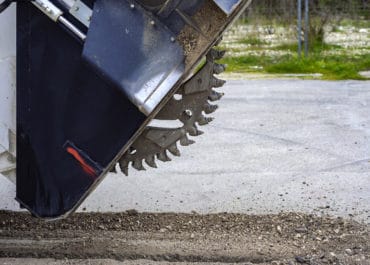
- Anders als bei den herkömmlichen Grabenfräsen können sie mit unserem Fräsrad viel engere und kleinere Baustellen bearbeiten
- Gerade bei der Glasfaserverlegung sind saubere Gräben sehr wichtig, um das Kabel nicht zu beschädigen
- Auch durch Asphalt und Steine fräst dieses Fräsrad ohne Probleme einen sauberen Graben für eine optimale Verlegung eines Kabels
- Eine weitere Besonderheit, die das Fräsrad noch flexibler macht ist die hydraulische Seitenversetzung auf dem hinteren Querbalken
- Sie können also ihr Fräsrad hydraulisch von rechts nach links bewegen, je nachdem auf welcher Seite sich die Baustelle befindet
- Dies ist ein enormer Vorteil, wenn sie in unzugänglichen Räumen fräsen müssen
- Dank dieser Seitversetzung können sie mit ihrem Trägergerät beispielsweise Problemlos auf der linken Seite fahren, während sie rechts von sich mit dem Rad fräsen
- Dies reicht sowohl für Micro Trenching, als auch für Glasfaserverlegung oder breitere Kabel
LIBA Grabenfräse GM4 als Trägermaschine
In Kombination bieten wir gerne unsere GM 4 an. Diese eignet sich hervorragend als Trägergerät und ist darüber hinaus auch recht leicht und agil. Natürlich ist die Maschine auch an anderen Trägergeräten gut einsetzbar. Bereits ein Gewicht von ca. 3500 KG reicht aus, um vernünftig mit dieser Maschine zu arbeiten. Die Hydraulikleistung sollte bei 80 Litern bei 300 Bar möglich sein.
Auf was kommt es beim Micro-Trenching an?
Da es beim Micro-Trenching darauf ankommt einen kleinen, aber sauberen Graben zu fräsen ist unser Fräsrad ideal für diese Aufgabe. Durch die Stabilität und Robustheit dieser Maschine sind perfekte Gräben, selbst im Asphalt, kein Problem. Des weiteren bieten wir auch einen Verlegeschacht für die Kabelverlegung mit an. Dies ermöglicht ihnen ein noch schnelleres und effektivers Arbeiten. Das zu verlegende Kabel wird durch diesen Schacht direkt hinter der Fräse verlegt, wodurch sie fräsen und verlegen in einem Zug erledingen können. Dies spart Zeit und somit wiederum Kosten. Auch schont dies die Umwelt, da sie schneller mit ihrer Baustelle fertig sind und der Verkehr schneller wieder ins rollen kommt. Dadurch wird die Abgasbelastung reduziert. Bei weiteren Fragen, Klicken sie Hier!
Minimaler Graben, maximale Geschwindigkeit!
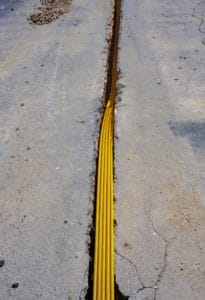 Sollten Sie sich für das Micro-Trenching entscheiden, so haben sie einige erwähnenswerte Vorteile dadurch. Dieses Verfahen ist nicht nur aus ökonomischer Sicht lokerativer sondern auch ökologisch. Wie bereits genannt gibt es einige Vorteile beim Micro-Trenching, die der Umwelt sehr zu gute kommen. Beispielsweise wird durch die schneller fertig gestellte Arbeit der Verkehr schneller wieder aufgenommen, was dazu führt dass weniger Abgase freigegeben werden.
Sollten Sie sich für das Micro-Trenching entscheiden, so haben sie einige erwähnenswerte Vorteile dadurch. Dieses Verfahen ist nicht nur aus ökonomischer Sicht lokerativer sondern auch ökologisch. Wie bereits genannt gibt es einige Vorteile beim Micro-Trenching, die der Umwelt sehr zu gute kommen. Beispielsweise wird durch die schneller fertig gestellte Arbeit der Verkehr schneller wieder aufgenommen, was dazu führt dass weniger Abgase freigegeben werden.
Bei diesem Verfahren werden mittels Fräsetechnik schmale Gräben und Schlitze in den Asphalt eingebracht. Dadurch wird nur eine geringe Grabenbreite und tiefe beansprucht und eine schnelle Fertigstellung von Glasfasertrassen ermöglicht. Neben dem Micro-Trenching sollen zusätzlich Leerrohre genutzt und oberirdisch ausgebaut werden.
Trenching ist eine von mehreren Sonderverlegetechniken und wird in der Regel immer in Kombination zu anderen Verfahren eingesetzt. Wichtig für den sinnvollen Einsatz ist die Unterscheidung der Verfahren im Hinblick auf die Grabenbreite und die Grabentiefe. Dazu kommt die Wiederherstellung der Oberflächen.
Beim Trenching wird ein nur bis zu 30 cm tiefer Graben in den Gehweg, bzw. die Straße gefräst, in die herkömmliche Kabelschutzrohre bzw. Flatliner mit den entsprechenden Glasfaserkabeln verlegt werden. Die Verfüllung des Kabelgrabens erfolgt umgehend nach der Verlegung. Als Verfüllbaustoff wird anschließend ein frostsicherer, zeitweilig fließfähiger, selbstverdichtender Baustoff verwendet. Somit sind Verkehrsbehinderungen nur von kurzer Dauer.
Es gibt übrigens mehrere Trenching-Verfahren, nämlich Micro-, Mini- und Macro-Trenching. Die unterscheiden sich jeweils in der Tiefe und Breite der realisierten Frässchlitze sowie in der verwendeten Schneide- beziehungsweise Frästechnik.
-
-
Netzbau
-
Freileitungsbau
-
Rohrleitungsbau
-
Netzausbau
-
Kabelmontage
-
Telekommunikation
-
LIBA präsentiert sich heute als ein gestrafftes Unternehmen in der Fertigung und Verwaltung. Mit einer Belegschaft von ca. 20 Mitarbeitern ist es in der Lage, hoch moderne und spezialisierte Maschinen und Systemlösungen anzubieten. Hierzu gehören Selbstfahrer, Anbaugeräte oder Spezialmaschinen für vielfältigen Einsatz. Der Exportanteil beträgt 35% des Gesamtumsatzes.
Gerne geben wir Ihnen in unserem Lingener Werk die Möglichkeit, sich von der Leistungsfähigkeit unserer Grabenfräsen „Grabenmeister“ persönlich zu überzeugen. Mit Produkten von LIBA wird die Arbeit beträchtlich erleichtert und unsere Kunden erreichen durch perfektionierte Bearbeitungsprozesse eine entscheidende Verbesserung der Qualität.
Sie profitieren bei uns von langjähriger Erfahrung und professioneller Expertise auch im Bereich Micro-Trenching
 Sollten Sie Fragen zu unseren Grabenfräsen zur Kabelverlegung haben oder ein Angebot wünschen, nutzen Sie bitte unser Kontaktformular. Wir werden uns umgehend mit Ihrem Anliegen auseinandersetzen und Sie kontaktieren. Sie können uns auch gerne unter +49 (0) 591 – 76 314 anrufen.
Sollten Sie Fragen zu unseren Grabenfräsen zur Kabelverlegung haben oder ein Angebot wünschen, nutzen Sie bitte unser Kontaktformular. Wir werden uns umgehend mit Ihrem Anliegen auseinandersetzen und Sie kontaktieren. Sie können uns auch gerne unter +49 (0) 591 – 76 314 anrufen.

